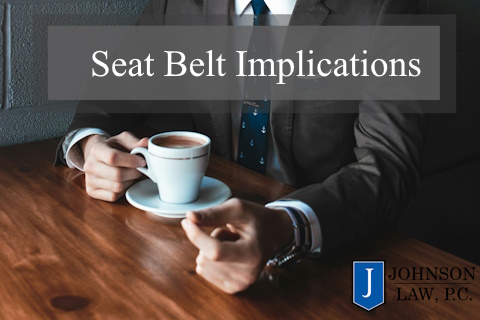Understanding The Impact of Not Wearing A Seatbelt on Your Insurance Claim
If you were involved in a car accident and weren’t wearing a seatbelt, you might wonder: does not wearing a seatbelt affect insurance claim outcomes? The rules and regulations vary by state, but generally, not wearing a seatbelt can impact your ability to recover full compensation for your injuries. This guide will help you understand the implications and what steps you can take to protect your rights.
Quick Links

The Principle of Comparative Negligence
In many states, the principle of comparative negligence is used to determine how damages are awarded in personal injury claims. Comparative negligence means that if you are partially at fault for your injuries, your compensation can be reduced by your percentage of fault.
- Example: If you were not wearing a seatbelt and suffered injuries in an accident, the insurance company might argue that your injuries were more severe because you were not properly restrained. If you are found to be 20% at fault for your injuries due to not wearing a seatbelt, your compensation could be reduced by 20%.
State-Specific Seatbelt Laws
Each state has its own laws regarding seatbelt use and how it affects personal injury claims. Here are some general trends:
- California: California follows a pure comparative negligence rule. This means that if you are involved in an accident and not wearing a seatbelt, your compensation can be reduced by the percentage of fault attributed to you. For example, if you are found 25% at fault for not wearing a seatbelt, your compensation will be reduced by 25%. This applies regardless of how high your percentage of fault is; you can still recover damages even if you are found mostly at fault (West Coast Trial Lawyers) (Chain | Cohn | Clark) (Shouse Law Group).
- Texas: Texas follows a modified comparative negligence system. This means that your compensation can be reduced if it is determined that your failure to wear a seatbelt contributed to your injuries. If you are found to be more than 50% at fault for your injuries, you may not be able to recover any compensation at all. The Texas Supreme Court has ruled that evidence of seatbelt non-use is admissible in court to help apportion responsibility in civil lawsuits. This decision allows the jury to consider whether not wearing a seatbelt contributed to the severity of the injuries sustained in an accident (Kane Russell Coleman Logan PC) (Texas Injury Lawyers Blog) (H&H Personal Injury) (Crosley Law).
- New York: New York follows a pure comparative negligence rule. This means that in a personal injury claim, your compensation can be reduced by the percentage of fault assigned to you. For instance, if you are found to be 20% at fault, your compensation will be reduced by 20% (Personal Injury Lawyer NYC | RMFW Law) (Personal Injury Lawyer NYC | RMFW Law).
- Florida: In Florida, the comparative negligence laws significantly impact personal injury claims. As of March 24, 2023, Florida shifted from a pure comparative negligence system to a modified comparative negligence system. Under this new framework, a plaintiff can recover damages only if they are found to be 50% or less at fault for the incident. If the plaintiff's fault exceeds 50%, they are barred from receiving any compensation. This change applies to all negligence claims except those related to medical malpractice, which continue to follow the pure comparative negligence standard (Avera & Smith) (Porcaro Law Group).
Injuries Caused by Not Wearing a Seatbelt
Failing to wear a seatbelt can result in more severe injuries during a car accident. Common injuries include:
- Head Injuries: Hitting the windshield or dashboard.
- Chest Injuries: From striking the steering wheel.
- Internal Injuries: From being thrown around inside the vehicle.
- Ejections: Being thrown from the vehicle, often resulting in severe or fatal injuries.
Steps to Take After an Accident
- Seek Medical Attention: Your health is the priority. Seek immediate medical care.
- Document the Scene: Take photos, gather witness statements, and get a copy of the police report.
- Consult with an Attorney: A personal injury attorney can help you navigate the complexities of your case and work to minimize any reduction in your compensation due to not wearing a seatbelt.
- File Your Claim: Submit all necessary documentation to your insurance company.
How a Personal Injury Attorney Can Help
An experienced personal injury attorney can help you:
- Evaluate Your Case: Determine the impact of not wearing a seatbelt on your specific situation.
- Gather Evidence: Collect medical records, witness statements, and other evidence to support your claim.
- Negotiate with Insurance Companies: Fight to maximize your compensation despite the potential reduction due to comparative negligence.
- Represent You in Court: If necessary, your attorney will advocate for you in court to ensure you receive fair compensation.
Frequently Asked Questions
Can I still file a claim if I wasn’t wearing a seatbelt?
Yes, you can still file a claim. However, your compensation may be reduced based on your percentage of fault for not wearing a seatbelt.
How much can my compensation be reduced?
The reduction varies by state and the specifics of your case. Generally, it’s based on the percentage of fault attributed to not wearing a seatbelt.
Do all states reduce compensation for not wearing a seatbelt?
No, the rules vary by state. Some states have specific provisions regarding seatbelt use, while others may not consider it a significant factor in reducing compensation.
Oregon-Specific Seatbelt Laws
In Oregon, the law addresses how not wearing a seatbelt affects personal injury claims. According to ORS 31.760, the nonuse of a seatbelt can only mitigate the injured party's damages by a maximum of 5%. This means that even if you weren’t wearing a seatbelt, the reduction in your compensation cannot exceed 5% of the total amount you would otherwise be entitled to. For detailed information and specific cases related to Oregon, please visit our Portland Seat Belt Injury Attorney page.
Contact a Personal Injury Attorney Today
If you have been injured in a car accident and were not wearing a seatbelt, it’s crucial to understand your rights and options. Does not wearing a seatbelt affect insurance claim outcomes? Yes, it can. Contact an experienced personal injury attorney to discuss your case and ensure you receive the compensation you deserve. Don’t navigate the legal complexities alone—get professional help today.
We will review your case for free.
Pay us nothing unless we get you a better settlement.
We work on contingency.

